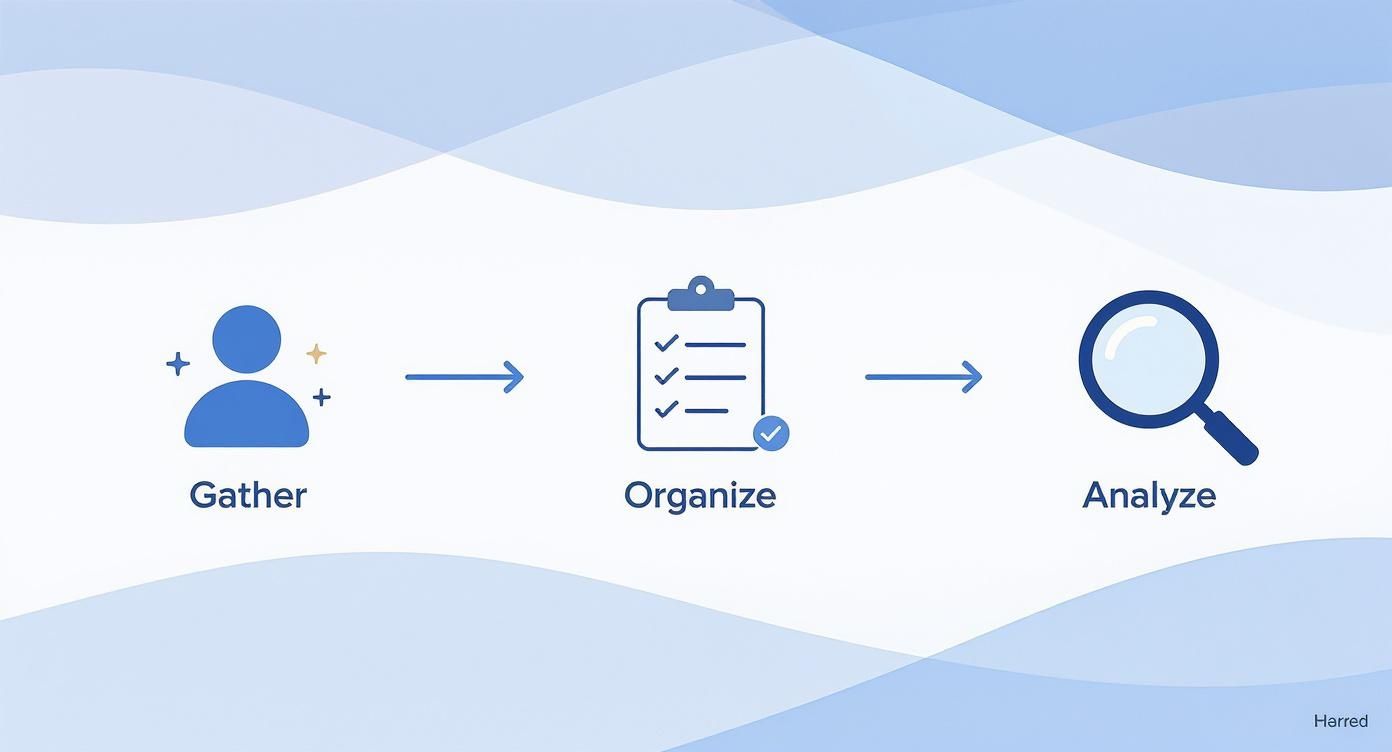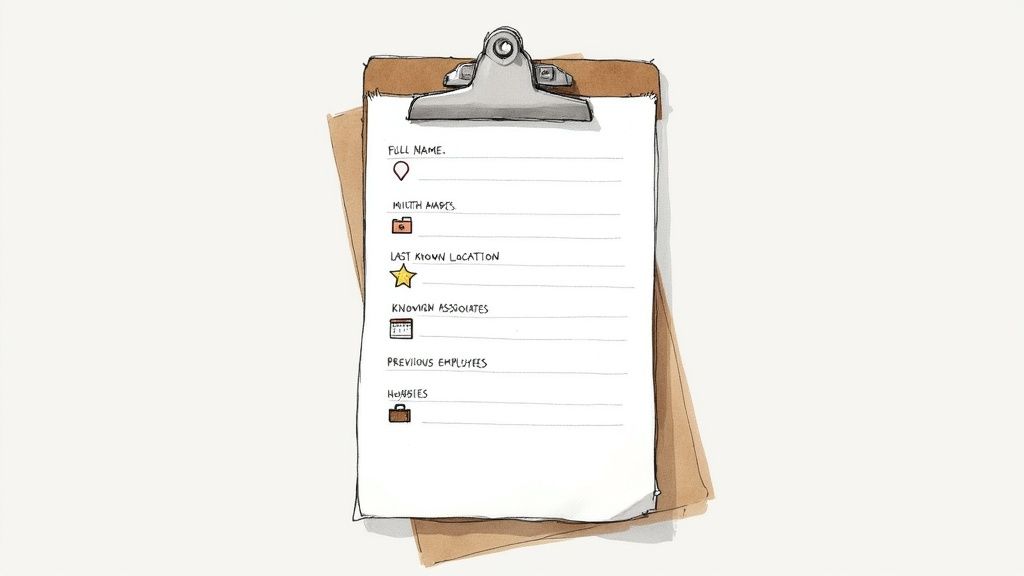Before you even type a single name into a search engine, the most crucial work begins right at your desk. It’s all about creating a detailed search profile. This means methodically gathering every fragment of information you have about the person.
Think of it as building a case file. The more detail you have at the start, the sharper and more focused your search will be later on. This initial groundwork is what separates a frustrating, dead-end search from a successful one.
Creating Your Search Profile
Let’s start with the fundamentals. The goal here is to collect the core data points that will form the backbone of your investigation.
What do you actually know?
- Full name: This includes any middle names, maiden names, or even common nicknames. People often use variations online.
- Last known location: Even a town or a general area can be a powerful starting point for narrowing down regional records.
- Age or birth year: This is a huge help for filtering out people with the same name. It provides a timeline to work with.
- Connections: Who were their friends, family, or colleagues? These relationships often leave digital breadcrumbs.
Getting these basics down on paper sets you up for the more advanced steps, like diving into public records or using Open Source Intelligence (OSINT) techniques. For a really thorough look at this, check out this comprehensive guide to background checking using OSINT.
Why Every Little Detail Matters
I’ve seen cases cracked open by the smallest, seemingly insignificant detail. A mention of a niche hobby, for instance, led me straight to a specific online forum, and from there, to the person we were looking for. Never dismiss a small clue.
The process is straightforward: you gather what you know, organise it logically, and then analyse it to decide where to look next.

This simple flow—Gather, Organise, Analyse—is the key to making real progress quickly.
For some practical, real-world examples of how this plays out, you might find our specific guide on how we trace a person quite useful.
An Information Gathering Checklist
To keep things organised, a structured checklist is your best friend. It ensures you don't miss anything and helps you see the bigger picture before you start searching.
Here's a simple framework to get you started.
Information Gathering Checklist
| Information Category | Details to Collect | Why It's Important |
|---|---|---|
| Name Variations | Nicknames, initials, maiden names | People use different names across various platforms and records. |
| Location History | Past towns, schools, workplaces | This helps you target your search to specific geographical databases. |
| Network Connections | Family, friends, colleagues | These connections can unlock new avenues for your search on social media or in professional circles. |
Once this checklist is filled out, you’re no longer just guessing. You have a strategic plan that will save you an incredible amount of time.
Turning Clues into Actionable Steps
With your profile in hand, you can start matching this information against specific databases and public records. For example, knowing a last known address allows you to focus on local council records or property databases for that specific area, instantly cutting down the noise.
I once narrowed a search for someone with a very common name from thousands of possibilities down to just a dozen by filtering by a single London borough and an approximate age.
- Cross-reference what you find in public records with social media profiles to confirm you've got the right person.
- Use the person's age to immediately rule out mismatches. It’s a simple but powerful filter.
- Did they have a specific trade or profession? Look for professional licences or registers.
By systematically working through your organised data, you start turning hunches into solid, verifiable leads. Now, let’s look at how to take this profile and use it to uncover digital footprints.
"Starting with a detailed profile cuts searching time by up to half. It’s the single most important thing you can do."
This foundation is what transforms a jumble of clues into a clear roadmap. The better your initial profile, the higher your chances of success.
Using Digital Footprints to Find Clues

With your initial information organised, it’s time to move the search online. Pretty much everyone leaves some kind of digital footprint these days, and learning to follow that trail is a core skill when trying to find someone by name.
A basic Google search is the obvious first port of call, but let's be honest, it's a blunt instrument. If you're looking for someone with a common name, you'll be swamped with irrelevant results. The real trick is to master advanced search techniques to cut through the noise.
For example, simply searching for John Smith is almost useless. But putting his name in quotation marks—"John Smith"—tells Google to search for that exact phrase. It’s a tiny change, but it makes a world of difference.
Mastering Search Engine Tactics
You can take this a step further by layering different commands. Let’s say you know John Smith used to work at a company called "Innovate Solutions" and lived in Manchester. A much more powerful search would be: "John Smith" AND "Innovate Solutions" AND Manchester. This forces the search engine to return only pages that contain all three of those specific details.
Here are a few other operators I regularly use that are incredibly effective:
- site: This lets you search within one specific website. For instance,
“John Smith” site:linkedin.comwill only show you results for him on LinkedIn. - filetype: You can hunt for specific files, like PDFs or Word documents. This is fantastic for finding old résumés or public reports. A search like
“John Smith” résumé filetype:pdfcan turn up gold. - – (minus sign): This is for excluding terms. If you know the John Smith you’re after isn't an accountant, you could search
“John Smith” -accountantto filter out all the wrong people.
Using these techniques is about being methodical. You’re not just throwing a name into the void; you’re conducting a targeted investigation, narrowing down the possibilities one search at a time.
Uncovering Clues on Social Media
Social media is an absolute goldmine for this kind of work. Platforms like Facebook, LinkedIn, and even Instagram have search functions that let you filter by more than just a name, including details like location, workplace, or university.
A good starting point is to search for the person's name along with their last known city or employer. LinkedIn is especially powerful for tracking professional moves. On Facebook, don’t forget to check the friends lists of mutual acquaintances. It’s often through these shared connections that you can confirm you’ve found the right profile.
A pro tip for social media searches: always check photos the person has been tagged in by others. These often provide more up-to-date clues about their location, social circles, and recent activities than their own curated profile.
Look beyond the obvious. A person’s public posts, photos they've 'liked', or groups they've joined can paint a picture of their hobbies, interests, and sometimes even their daily routine. While your goal is to find an individual, understanding the data they create is vital. Resources like the Best Facebook Analytics Tool can give you an idea of just how much information is being tracked on these platforms.
If your search turns up an old phone number, that's another lead you can follow. We have a dedicated guide on how to approach this, which you can find here: tracing telephone numbers in the UK. By weaving together these different digital search strategies, you can start building a comprehensive picture of the person you’re looking for.
Digging into UK Public and Government Records

When the digital trail goes cold, it's time to turn to official UK public and government records. This is where you can often find the kind of solid, verifiable information that social media just can't provide. These records are structured, official, and can cut right through the noise to give you concrete facts.
It’s crucial to go into this with realistic expectations. Government records are a powerful tool, but they aren't some magic, all-seeing database. Each one serves a very specific purpose, and honestly, knowing where to look is half the battle.
Take, for example, the process for finding someone who is officially missing. It's a surprisingly complex and decentralised system in the UK. The Home Office doesn't maintain one central database. Instead, individual police forces manage their own reports until a case is unresolved for more than 72 hours. Only then does it get logged with the UK Missing Persons Unit. You can get a clearer picture of the official process for missing persons reporting on parallelparliament.co.uk.
Starting with the Electoral Roll
The UK electoral roll is a classic starting point for pinning down someone's address. While the full register is restricted for voting and law enforcement, there's a publicly available version called the 'open register'. It lists the names and addresses of everyone who hasn’t opted out.
You can usually view the open register in person at local council offices or public libraries. For a more convenient, nationwide search, several reputable online services offer access for a fee. Just be mindful of its limits—not everyone is registered, and the information isn't always current.
Uncovering Clues in Companies House and the Land Registry
If there's a chance the person you're looking for has a business background, Companies House is a goldmine. It’s a completely free resource where you can search for company directors by name. You'll often find their correspondence address, date of birth, and a full history of their appointments. It's a brilliant way to confirm details and potentially find a current location.
When it comes to property, HM Land Registry holds the records for England and Wales (Scotland and Northern Ireland have their own bodies). For a small fee, you can pull the title register for a specific property, which lists the current owner. This is most effective when you already have a suspected address and just need to confirm who lives there.
A Pro Tip From Experience: Public records are your source for hard facts, but they're often walled off from each other. The real trick is to cross-reference them. For instance, use an address you find on Companies House and see if it matches up with electoral roll data. That's how you build a reliable picture.
What About Court Records and Other Sources?
Court records can sometimes yield results, but this route is definitely more challenging. While many civil and criminal case records are public, getting your hands on them often means a trip to the specific court where the case was heard. If you persevere, you might find names and addresses listed within the case files.
These official channels are an essential part of any serious search, adding a layer of verification that a simple online search can't match. To learn more about pulling these different threads together, take a look at our comprehensive guide on conducting a detailed background check. It shows you how to combine these data points to create a truly complete and accurate profile.
When to Turn to Paid People Finder Services

So, you’ve hit a wall with the free methods. The Google searches are leading nowhere, and social media has gone quiet. This is the point where it often makes sense to consider a paid people finder service. These platforms can be incredibly effective because they pull together information from countless sources—far more than you could ever access on your own.
What you're really paying for is access. These services tap into subscription-only databases, consumer records, and historical archives that simply aren't open to the public. For a relatively small fee, they can do the heavy lifting, delivering a consolidated report that might uncover exactly what you need: a current address, a new phone number, or other vital details.
How to Pick the Right Service
Be warned, not all people-finding websites are the same. It's crucial to know what you're getting for your money before you sign up. In the UK, a service like 192.com is a popular starting point for its access to electoral roll data, but for a deeper dive, you might look towards more specialised tracing agents.
Before you commit, ask yourself a few questions:
- What are their sources? Are they just repackaging public records, or do they have access to proprietary data that will give you an edge?
- How detailed is the report? Are you just getting a potential address, or will it include things like property records, directorships, and other contact details?
- What's the cost? Is it a one-off payment for a single search, or will you be tied into a monthly subscription? Always read the small print.
Think of it this way: these services are to us what advanced forensic tools are to law enforcement. The police have access to powerful resources like the National DNA Database and the IDENT1 fingerprint database to solve cases. In fact, in 2023–2024, searches on IDENT1 led to seven positive identifications in Missing Persons Unit cases. You can read more about how forensic databases are used on GOV.UK.
Comparison of UK People Finder Services
To help you decide which tool best fits your search requirements, here’s a quick overview of some popular paid services in the UK.
| Service Name | Key Features | Typical Cost | Best For |
|---|---|---|---|
| 192.com | Access to electoral roll data, company director reports. | Pay-per-search credits | Quick address checks and confirming basic details. |
| FinderMonkey | No-find, no-fee tracing service run by professional agents. | One-off fee (£40-£100+) | Complex cases where DIY searches have failed. |
| Peopletracer | Combines public records with other data sets for deeper search. | Subscription-based | Ongoing needs or tracing multiple individuals. |
| UK People Finder | Specialises in locating debtors and missing family members. | Fixed fee per trace | Finding people for legal reasons or reconnecting with family. |
Each service has its strengths, so matching the platform to your specific goal is the key to getting a good result without wasting money.
A Word of Caution: Interpreting the Results
Getting the report is just the beginning. The information you receive is a lead, not a certainty. Data can be old, databases can have errors, and people move. Don’t take everything at face value.
Always approach the results with a critical eye. The goal is to verify, not just accept. Cross-reference any new information, such as an address or phone number, with other sources to confirm its accuracy before taking any action.
For instance, if you get a new address, can you find any other evidence to back it up? Look for recent social media posts geo-tagged in that town, or see if you can find them on a local version of the electoral roll. We've put together a more detailed guide that digs into whether people finding websites are any good and offers tips on making sense of what they tell you.
Finally, remember to use this information responsibly. These services operate within the law by gathering available data, but how you use that data is up to you. They are a tool for finding people, not for surveillance.
When It’s Time to Hire a Private Investigator
You've spent hours scrolling through social media, you’ve sifted through public records, and maybe you’ve even shelled out for an online search report that turned up nothing. It’s a frustrating dead end, and it’s precisely at this point that a professional’s skills become indispensable.
Hiring a private investigator isn’t about giving up; it’s about acknowledging that some searches demand a level of access and expertise that simply isn’t available to the public.
This is especially true in delicate circumstances. If your search is tied to a legal matter, a child custody dispute, or you’re worried about a vulnerable individual, a PI brings a crucial layer of professionalism. They work within strict ethical and legal boundaries, ensuring that any information they gather is obtained correctly and can be used as evidence if the situation escalates.
Signs You Should Call a Professional
Sometimes, a digital footprint has been deliberately wiped clean, or the person you’re looking for has made it very clear they don’t want to be found. This is where an investigator's real work begins.
They have access to powerful, subscription-only databases and a network of human intelligence that can unlock information hidden from even the most determined online search. More importantly, they’re trained to connect seemingly random fragments of information into a coherent picture.
It might be time to bring in an expert if:
- You've hit a wall. Despite trying everything, you have no new leads to follow.
- The situation is legally complex. This could involve debt recovery, serving court documents, or sensitive matrimonial cases.
- You believe the person is actively hiding. A PI can employ discreet methods, including surveillance, to make progress.
- You are concerned for their safety. Professionals know how to navigate these situations with the necessary care and discretion.
Finding a Reputable Investigator in the UK
Choosing the right investigator makes all the difference. You’ll want to look for an agency with a proven track record, transparent pricing, and professional accreditations. Any reputable firm should offer a free, confidential consultation to talk through your case and give you an honest assessment of its chances.
Use that initial call to ask about their experience with similar cases and what their success rate looks like. You can find a list of vetted professionals to see what a qualified team of private investigators can do.
This expert approach is vital in more complex cases. While official statistics from the National Missing Persons Framework for Scotland show that most adults (76%) are found within 24 hours, cases involving people who repeatedly go missing often demand sophisticated work that spans multiple agencies and databases.
The real value of a professional investigator isn't just in the tools they use, but in their ability to think critically. They can spot the difference between a genuine lead and a red herring, which saves you an enormous amount of time, money, and emotional energy.
Ultimately, hiring a PI is an investment in getting a definitive answer. When you’ve exhausted every other option in your search, bringing in an expert with the right resources is the most effective and reliable path to a conclusion.
Common Questions About Finding Someone by Name
When you set out to find someone, it's natural for a few key questions to pop into your head. Getting straight answers is vital, not just for managing your own expectations but also for making sure you go about things the right way. Let's tackle some of the most common queries I hear.
Is It Legal to Search for Someone in the UK?
Absolutely. It is perfectly legal to look for someone using information that's already in the public domain. Think about it – we do it all the time. This includes tapping into search engines, browsing social media, or looking up public records like the electoral roll or the Companies House register.
The real question isn't about the search itself, but what you do with the information you find. If your reasons are legitimate – say, reconnecting with a long-lost school friend or tracing a debtor for a legal claim – you're on solid ground. Where you cross the line is if you use that information for illegal purposes like harassment, stalking, or fraud. That's when it becomes a criminal matter.
It's also worth noting that professional services are held to a high standard, operating under strict data protection laws like the Data Protection Act 2018 and GDPR. They have to handle data lawfully, which adds a layer of reassurance.
The core principle is simple: searching is legal, but how you use the information is what truly matters. Always act ethically and within the bounds of the law, respecting the individual's privacy at all times.
How Much Does It Typically Cost to Find Someone?
The cost can swing wildly, from absolutely nothing to hundreds of pounds. It all comes down to the methods you choose and how deep you need to dig.
Here's a realistic look at what you might expect to spend:
- Free Methods: Using social media, search engines, and basic public record searches will only cost you your time. This is always the best place to start.
- Minor Fees: Some official records come with a small administrative fee. For example, pulling a title deed from the Land Registry will usually set you back less than £10.
- Paid People Finder Websites: For a consolidated report from one of these online services, you're typically looking at a one-off fee somewhere between £10 and £50.
- Hiring a Private Investigator: This is obviously the biggest financial commitment. Rates often start from £40-£80 per hour, and a full, comprehensive trace could easily run to £300 or more.
Ultimately, your budget will be a major factor in deciding which avenues you can explore.
What If the Person Is Vulnerable or in Danger?
This is a critical point. If you have any genuine reason to believe someone is a vulnerable person, is at risk, or should be classed as a missing person, you must not try to find them yourself.
Your first and only move should be to contact your local police force immediately. Give them every single detail you have, no matter how insignificant it might seem. The police have the expertise, the official resources, and the authority to handle these sensitive cases safely and correctly. Their entire focus is on the person's welfare, and they are the only ones properly equipped to manage the situation.
When your search hits a wall and you need a professional, discreet hand to get the answers you need, UK Private Investigators is here to help. With decades of combined experience and a network of skilled agents across the country, we have the expertise to tackle even the most challenging cases. Visit us at https://www.ukprivateinvestigators.com to see how we can bring you clarity and peace of mind.

